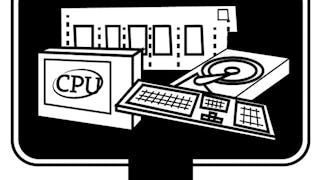Filter by
SubjectRequired
LanguageRequired
The language used throughout the course, in both instruction and assessments.
Learning ProductRequired
LevelRequired
DurationRequired
SkillsRequired
SubtitlesRequired
EducatorRequired
Explore the Computer Engineering Course Catalog
 Status: NewStatus: Free Trial
Status: NewStatus: Free TrialBirla Institute of Technology & Science, Pilani
Skills you'll gain: Integral Calculus, Engineering Calculations, Data Analysis, Probability & Statistics, Engineering Analysis, Computational Logic, Statistical Analysis, Linear Algebra, Logical Reasoning, Deductive Reasoning, Mathematical Modeling, Trigonometry, Analytics, Bayesian Statistics, Statistical Modeling, Artificial Intelligence and Machine Learning (AI/ML), Statistical Inference, Theoretical Computer Science, Programming Principles, Descriptive Analytics
 Status: Free Trial
Status: Free TrialSkills you'll gain: Software Development Life Cycle, Software Architecture, Software Design, Scrum (Software Development), Software Engineering, Software Design Patterns, Agile Methodology, Software Development, Programming Principles, Application Development, Cloud Development, Web Development, Back-End Web Development, Front-End Web Development, Computer Programming, Integrated Development Environments, Python Programming
 Status: Free
Status: FreePrinceton University
Skills you'll gain: Microarchitecture, Computer Architecture, Hardware Architecture, Computer Systems, Computer Engineering, Systems Architecture, Operating Systems, Performance Tuning, Scalability
 Status: Free
Status: FreePrinceton University
Skills you'll gain: Programming Principles, Computer Programming, Object Oriented Programming (OOP), Performance Tuning, Data Structures, Java Programming, Java, Computational Thinking, Computer Science, Algorithms, Animations, Debugging
 Status: Free Trial
Status: Free TrialUniversity of London
Skills you'll gain: Computer Science, Debugging, Development Environment, Computer Systems, Web Applications, Arithmetic, Computer Literacy, Javascript, Network Security, Computer Networking, Program Development, Computer Graphics, Web Design and Development, Cybersecurity, Computer Programming, Problem Management, Computational Thinking, General Mathematics, Systems Of Measurement, Problem Solving
 Status: NewStatus: Free Trial
Status: NewStatus: Free TrialUniversity of Colorado Boulder
Skills you'll gain: Computer Vision, Image Analysis, Computer Graphics, Visualization (Computer Graphics), Multimodal Prompts, Generative Model Architectures, Deep Learning, Applied Machine Learning, Computer Science, Artificial Intelligence and Machine Learning (AI/ML), Data Science, Artificial Intelligence, Data Ethics, Unsupervised Learning, Data Processing, Statistical Methods, Linear Algebra, Probability Distribution
What brings you to Coursera today?
 Status: Free Trial
Status: Free TrialThe Hong Kong University of Science and Technology
Skills you'll gain: Differential Equations, Linear Algebra, Matlab, Engineering Calculations, Engineering Analysis, Numerical Analysis, Finite Element Methods, Integral Calculus, Mathematical Software, Mechanical Engineering, Calculus, Algebra, Applied Mathematics, Mathematical Modeling, Engineering, Simulation and Simulation Software, Advanced Mathematics, Geometry, Computational Thinking, Estimation
 Status: Free Trial
Status: Free TrialUniversity of Colorado System
Skills you'll gain: TCP/IP, Local Area Networks, Routing Protocols, Network Routing, Digital Communications, OSI Models, Network Protocols, Communication Systems, Dynamic Host Configuration Protocol (DHCP), Network Planning And Design, Network Security, Network Architecture, General Networking, Computer Networking, Network Infrastructure, Network Performance Management, Wireless Networks, Telecommunications, Software-Defined Networking, Algorithms
 Status: Free
Status: FreePrinceton University
Skills you'll gain: Theoretical Computer Science, Data Structures, Computer Science, Computer Architecture, Algorithms, Programming Principles, Computational Logic, Computational Thinking, Java Programming, Computer Hardware
 Status: Free Trial
Status: Free TrialSkills you'll gain: Software Development Life Cycle, Software Architecture, Linux Commands, Bash (Scripting Language), Restful API, Shell Script, Git (Version Control System), GitHub, Flask (Web Framework), Software Design, Version Control, File Management, Scrum (Software Development), Application Deployment, Software Engineering, Linux, Data Import/Export, Programming Principles, Web Scraping, Python Programming
 Status: Free Trial
Status: Free TrialUniversity of California, Irvine
Skills you'll gain: Network Security, Computer Hardware, Hardware Architecture, Computer Systems, TCP/IP, Information Technology, General Networking, Computer Literacy, Network Protocols, Operating Systems, System Configuration, Software Installation, Computer Networking, File Systems

University of Colorado Boulder
Skills you'll gain: Software Configuration Management, Embedded Software, Embedded Systems, Git (Version Control System), Version Control, Build Tools, Software Development Tools, C (Programming Language), Development Environment, Program Development, Software Design, Hardware Architecture, Debugging, Command-Line Interface
Computer Engineering learners also search
In summary, here are 10 of our most popular computer engineering courses
- Mathematics for Engineering: Birla Institute of Technology & Science, Pilani
- Introduction to Software Engineering: IBM
- Computer Architecture: Princeton University
- Computer Science: Programming with a Purpose: Princeton University
- Introduction to Computer Science and Programming: University of London
- Computer Vision: University of Colorado Boulder
- Mathematics for Engineers: The Hong Kong University of Science and Technology
- Computer Communications: University of Colorado System
- Computer Science: Algorithms, Theory, and Machines: Princeton University
- Applied Software Engineering Fundamentals: IBM










